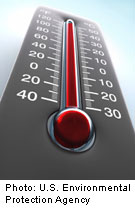- 8 Ways to Increase Dopamine Naturally
- 7 Best Breads for Maintaining Stable Blood Sugar
- Gelatin vs. Collagen: Which is Best for Skin, Nails, and Joints?
- The Long-Term Effects of Daily Turmeric Supplements on Liver Health
- Could Your Grocery Store Meat Be Causing Recurring UTIs?
- Are You Making This Expensive Thermostat Error This Winter?
- Recognizing the Signs of Hypothyroidism
- 10 Strategies to Overcome Insomnia
- Could Artificial Sweeteners Be Aging the Brain Faster?
- Techniques for Soothing Your Nervous System
Climate Change Predicted to Boost Heat-Related Deaths


As winter drags on, many people grow weary of frigid temperatures, ice and snow. For them, the good news is that summer is just around the corner.
The bad news is, there could be a huge rise in heat-related deaths during the summer months in the coming decades, a new study suggests.
The number of deaths caused by hot weather in England and Wales could nearly triple by the middle of the century, according to researchers.
This sharp spike in deaths will be due to the combination of climate change and an aging population, said Dr. Shakoor Hajat and colleagues at the London School of Hygiene and Tropical Medicine, and Public Health England.
The investigators analyzed data on weather patterns and death rates from 1993 to 2006 and applied it to projected climate changes and population increases in the 2020s, 2050s and 2080s. They concluded that the number of hot days in England and Wales will triple by the mid-2080s, and the number of cold days will decrease.
If no adaptive measures are taken, the current number of 2,000 heat-related deaths a year in England and Wales will increase 257 percent by the 2050s, while the current number of 41,000 deaths from cold will fall 2 percent due to milder winters, the researchers predicted.
Even though more people will continue to die due to cold weather than hot weather, rising temperatures will become increasing deadly, especially for the elderly. People aged 75 and older will be at greatest risk for heat-related death, according to the study published online Feb. 3 in the Journal of Epidemiology and Community Health.
The findings indicate that protection from hot weather will become most important for those aged 85 and older, partly because people are living longer and this group will make up a growing proportion of the elderly population.
Along with air conditioning, preventive measures could include more sustainable options such as shading and changes in building insulation and construction materials, the study authors noted in a journal news release.
More information
The U.S. Centers for Disease Control and Prevention offers hot weather tips.
Source: HealthDay
Copyright © 2026 HealthDay. All rights reserved.










